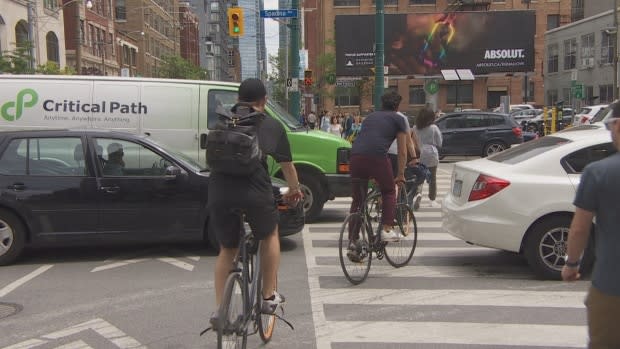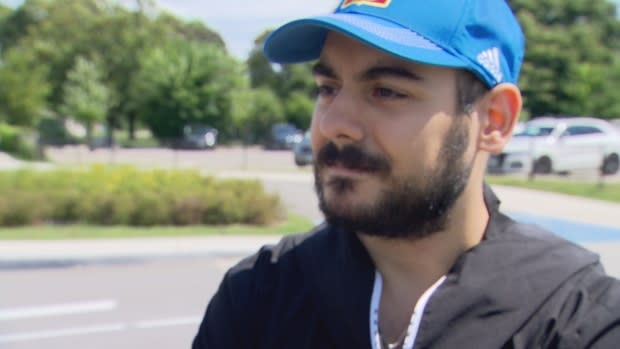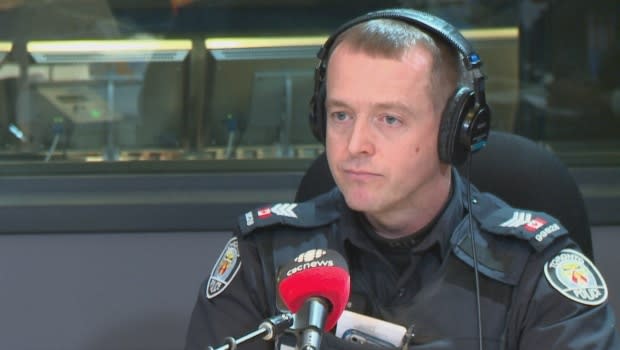Why cyclists are turning to civil courts to get justice for road rage attacks
A growing number of Toronto cyclists involved in road rage incidents with drivers feel let down by the justice system and are turning to private civil action to get their day in court.
James Cavalluzzo, a 51-year-old musician, was hoping to see the taxi driver charged with running him down on Richmond Street last June get what he deserved
"It was gridlock, rush hour. He pulled into the bike lane and just floored it to beat traffic. And then he tried to cut back," said Cavalluzzo, who has been using a bicycle to commute for 30 years.
"And so, when I was passing him I told the guy, 'Like, dude, you're going to kill somebody driving like that. I understand it's gridlock, but you shouldn't be driving 500 miles an hour in the bike lane.'"
The driver then rammed him with his cab and took off, Cavalluzzo told CBC Toronto.

"He basically was using his car as a weapon."
Later, the driver showed up with police officers after complaining that a crazy cyclist attacked him. But surveillance video from the area told a different story and police charged him with dangerous driving and assault.
When the case came up for trial on Thursday, Cavalluzzo arrived ready to testify, but the driver did not.
"I was hoping for my day in court." he said. "So there's a bench warrant out for [the cabbie's arrest] now. Hopefully he'll face some sort of justice."
Cavalluzzo is filing a claim this week in Ontario Superior Court for damages and he's not the only cyclist who is now seeking legal remedy after an apparently deliberate attack.
Mazda Amiryar, 30, was cycling home from work last August on the Martin Goodman Trail along Lake Shore Boulevard West when he approached a car blocking the separated bike lane. As he passed, he shook his head at the driver disapprovingly.
The graphic designer had a camera mounted on his helmet that recorded the same car driving along Lake Shore and pulling into the Boulevard Club's driveway. The driver waited for him to cross in front of his car and then hit him.
"I just had a bad feeling when I saw him waiting there and he wasn't moving. And then I think at the last second, I just braced myself for the impact," said Amiryar.
"I mean he rammed into me. I ended up over there in the bushes."

The driver then left the scene, Amiryar said. Police eventually tracked him down and charged him with Highway Traffic Act violations, including failing to yield, as well as leaving the scene and not reporting an accident.
But Amiryar says the video of the incident suggests the driver should face more serious criminal charges.
Sgt. Brett Moore of Toronto Police Traffic Services says while he is not the investigating officer in the case, in general, video of an incident doesn't always tell the whole story.
"What we see a lot of the times with with videos and YouTube things that are captured, it's one dimensional and often there's another side to the story that investigators get to learn that often doesn't come out in the public," Moore said.
"It's usually the first thing that gets the attention of people and then when we dig into it there's other factors in play."

"To me, I felt like the legal system let me down. The law let me down here," said Amiryar.
So he is filing a lawsuit on Monday, suing the driver for $2 million in total compensation for bodily harm and psychological injury. He says since the incident he has tried to get back on his bike, unsuccessfully, and now suffers from depression, anxiety, insomnia and flashbacks.
David Shellnutt, who calls himself the "Biking Lawyer," is acting on behalf of both Cavalluzzo and Amiryar.

He says in both cases his clients still suffer from being purposely mowed down and the drivers used their vehicles as a weapons in an attempt to kill or with the intent of injuring.
"Oftentimes, charges aren't laid or ... they fall through the cracks," said Shellnutt.
Burden of proof lower in civil cases, lawyer says
"Our justice system is already overburdened and just doesn't have the resources to pursue these kind of claims."
Shellnutt, 37, says he's had taken on four such cases over the past year.
He tells clients to assist the police and work with prosecutors to make sure justice is done in the criminal courts. But when charges ought to be laid and they're not, then going the civil route is an option as the burden of proof is not as high as in criminal cases.
"Sue them. Get insurance companies to take notice," said Shellnutt, who has had his brush with on street violence.
"People really need to relax and let things go. I know that from personal experience."

